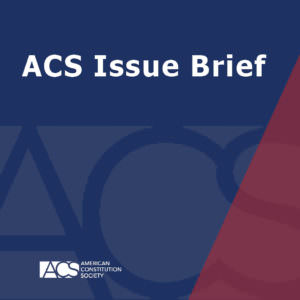Diverting and Reclassifying Misdemeanors Could Save $1 Billion per Year: Reducing the Need For and Cost of Appointed Counsel
Professor from Practice and Director of the Defender Initiative, Seattle University School of Law
December 15, 2010

ACS is pleased to distribute “Diverting and Reclassifying Misdemeanors Could Save $1 Billion per Year: Reducing the Need For and Cost of Appointed Counsel,” an Issue Brief by Robert C. Boruchowitz, Professor from Practice and the Director of the Defender Initiative at Seattle University School of Law. This paper is part of a series of Issue Briefs that ACS is publishing focused on ideas for a role that the federal government can play in helping improve indigent defense systems around the country. The series builds on the interest in pursuing reform expressed by Attorney General Eric Holder, Congress, and other federal policymakers to address the crisis in indigent defense that has existed since the Supreme Court’s 1963 decision in Gideon v. Wainwright, the landmark case establishing the right to counsel for indigent defendants.
In his issue brief, Professor Boruchowitz discusses the heavy burden placed on the criminal justice and indigent defense systems around the country by the approximately ten million misdemeanor cases filed each year in state and municipal courts. He observes that minor, non-violent offenses can make up between 40% and 50% of the caseload in some courts and that in addition to the cost of courts, judges, prosecutors, and defense lawyers, “taxpayers expend on average $80 per inmate per day to lock up people accused of things like turnstile jumping, fish and game violations, minor in possession of alcohol, dog leash violations, driving with a suspended license, and feeding the homeless.” Professor Boruchowitz highlights diversion programs and reclassifications efforts from around the country that have been very successful in alleviating the burdens and costs imposed by these cases and argues that the U.S. Department of Justice could help advance these reforms through providing education about their benefits and supporting their expansion around the country. He concludes that
“[b]y diverting or reclassifying these offenses as non-criminal violations, local and state governments could save hundreds of millions, perhaps more than $1 billion per year. In the process . . . the reduced burdens on millions of defendants would allow them to work and to meet their obligations, and the unfairness related to racial disparity would be reduced.”
Read the full Issue Brief here: Diverting and Reclassifying Misdemeanors Could Save $1 Billion per Year: Reducing the Need For and Cost of Appointed Counsel
